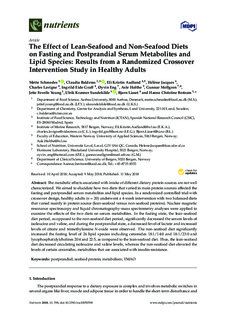| dc.contributor.author | Schmedes, Mette | |
| dc.contributor.author | Balderas, Claudia | |
| dc.contributor.author | Aadland, Eli Kristin | |
| dc.contributor.author | Jacques, Hélène | |
| dc.contributor.author | Lavigne, Charles | |
| dc.contributor.author | Graff, Ingvild Eide | |
| dc.contributor.author | Eng, Øyvin Andre Solberg | |
| dc.contributor.author | Holthe, Asle | |
| dc.contributor.author | Mellgren, Gunnar | |
| dc.contributor.author | Young, Jette Feveile | |
| dc.contributor.author | Sundekilde, Ulrik Kræmer | |
| dc.contributor.author | Liaset, Bjørn | |
| dc.contributor.author | Bertram, Hanne Christine | |
| dc.date.accessioned | 2018-08-01T12:10:42Z | |
| dc.date.available | 2018-08-01T12:10:42Z | |
| dc.date.created | 2018-05-24T10:51:40Z | |
| dc.date.issued | 2018 | |
| dc.identifier.citation | Nutrients. 2018, 10:598 (5), 1-12. | nb_NO |
| dc.identifier.issn | 2072-6643 | |
| dc.identifier.uri | http://hdl.handle.net/11250/2507134 | |
| dc.description.abstract | The metabolic effects associated with intake of different dietary protein sources are not well characterized. We aimed to elucidate how two diets that varied in main protein sources affected the fasting and postprandial serum metabolites and lipid species. In a randomized controlled trial with crossover design, healthy adults (n = 20) underwent a 4-week intervention with two balanced diets that varied mainly in protein source (lean-seafood versus non-seafood proteins). Nuclear magnetic resonance spectroscopy and liquid chromatography-mass spectrometry analyses were applied to examine the effects of the two diets on serum metabolites. In the fasting state, the lean-seafood diet period, as opposed to the non-seafood diet period, significantly decreased the serum levels of isoleucine and valine, and during the postprandial state, a decreased level of lactate and increased levels of citrate and trimethylamine N-oxide were observed. The non-seafood diet significantly increased the fasting level of 26 lipid species including ceramides 18:1/14:0 and 18:1/23:0 and lysophosphatidylcholines 20:4 and 22:5, as compared to the lean-seafood diet. Thus, the lean-seafood diet decreased circulating isoleucine and valine levels, whereas the non-seafood diet elevated the levels of certain ceramides, metabolites that are associated with insulin-resistance. | nb_NO |
| dc.language.iso | eng | nb_NO |
| dc.title | The effect of lean-seafood and non-seafood diets on fasting and postprandial serum metabolites and lipid species: Results from a randomized crossover intervention study in healthy adults | nb_NO |
| dc.title.alternative | The effect of lean-seafood and non-seafood diets on fasting and postprandial serum metabolites and lipid species: Results from a randomized crossover intervention study in healthy adults | nb_NO |
| dc.type | Journal article | nb_NO |
| dc.type | Peer reviewed | nb_NO |
| dc.description.version | publishedVersion | nb_NO |
| dc.source.pagenumber | 1-12 | nb_NO |
| dc.source.volume | 10:598 | nb_NO |
| dc.source.journal | Nutrients | nb_NO |
| dc.source.issue | 5 | nb_NO |
| dc.identifier.doi | 10.3390/nu10050598 | |
| dc.identifier.cristin | 1586371 | |
| dc.relation.project | Norges forskningsråd: 200515 | nb_NO |
| cristin.unitcode | 7431,0,0,0 | |
| cristin.unitname | Havforskningsinstituttet | |
| cristin.ispublished | true | |
| cristin.fulltext | original | |
| cristin.qualitycode | 1 | |
